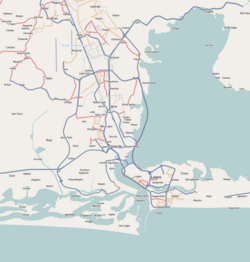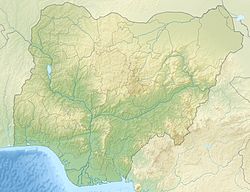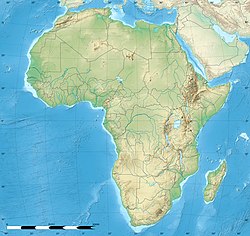
Back Lagos Afrikaans Lagos ALS ሌጎስ Amharic Lagos AN Legọs ANN لاغوس Arabic لاڭوص ARY لاجوس ARZ লাগ'চ Assamese Lagos AST
Lagos
Èkó (Yoruba) | |
|---|---|
| Nickname(s): | |
| Motto(s): Èkó ò ní bàjẹ́! (Yoruba, literally, "Lagos will not spoil!"; colloquially, "Lagos will prevail!") | |
 Lagos shown within the State of Lagos | |
| Coordinates: 6°27′18″N 3°23′03″E / 6.455027°N 3.384082°E | |
| Country | |
| State | Lagos |
| LGA(s)[note 1] | List of LGAs
|
| Settled | 15th century |
| Founded by | Awori subgroup of the Yoruba[5] |
| Government | |
| • Governor of Lagos | Babajide Sanwo-Olu |
| • Deputy Governor | Femi Hamzat |
| • Supreme Judge | Kazeem Alogba |
| Area | |
| 1,171.28 km2 (452.23 sq mi) | |
| • Land | 999.6 km2 (385.9 sq mi) |
| • Water | 171.68 km2 (66.29 sq mi) |
| • Urban | 907 km2 (350 sq mi) |
| • Metro | 2,706.7 km2 (1,045.1 sq mi) |
| Elevation | 41 m (135 ft) |
| Population (2006 census)[note 1] | |
| 8,048,430 | |
| 16,437,435 | |
| • Rank | 1st |
| • Density | 6,871/km2 (17,800/sq mi) |
| • Urban | 16,637,000[7] |
| • Urban density | 14,469/km2 (37,470/sq mi) |
| • Metro | 21,000,000 (estimated)[6] |
| • Metro density | 7,759/km2 (20,100/sq mi) |
| Demonym | Lagosian |
| GDP | |
| • Metropolis | ₦ 41.2 trillion US$ 102.0 billion (2021) |
| • Metro | ₦ 46.2 trillion US$ 114.5 billion (2021) |
| Time zone | UTC+1 |
| Area code | 010[9] |
| Climate | Aw |
| |
Lagos (/ˈleɪɡɒs/ LAY-goss;[10][11] Yoruba: Èkó), or Lagos City, is a large metropolitan city in southwestern Nigeria. With an upper population estimated above 21 million dwellers, it is the largest city in Nigeria, the most populous urban area on the African continent,[12][13][14][15][16] and one of the fastest-growing megacities in the world. Lagos was the national capital of Nigeria until the government's December 1991 decision to move their capital to Abuja, in the centre of the country.[17][18][19] Lagos is a major African financial centre and is the economic hub of Lagos State and Nigeria at large. The city has a significant influence on commerce, entertainment, technology, education, politics, tourism, art, and fashion in Africa. Lagos is also among the top ten of the world's fastest-growing cities and urban areas.[27][28] In 2024, Time Out magazine ranked Lagos as the 19th best city to visit in the world. A megacity, it has the second-highest GDP in Africa,[2][29] and houses one of the largest and busiest seaports on the continent.[30][31][32] Due to the large urban population and port traffic volumes, Lagos is classified as a Medium-Port Megacity.[33]
Lagos emerged as a home to the Awori subgroup of the Yoruba of West Africa in the 15th century, which are contained in the present-day Local Government Areas (LGAs) of Lagos Island, Eti-Osa, Amuwo-Odofin and Apapa. Before the 15th century, the Awori settled on a Farmstead along the coastal line in and around which they worked and lived. The Farmstead translates to Ereko in Yoruba, from which comes the Lagos indigenous name "Eko". The lands are separated by creeks, fringing the southwest mouth of Lagos Lagoon, while being protected from the Atlantic Ocean by barrier islands and long sand spits such as Bar Beach, which stretch up to 100 km (62 mi) east and west of the mouth. Due to rapid urbanisation, the city expanded to the west of the lagoon to include areas in the present day Lagos Mainland, Ajeromi-Ifelodun, and Surulere. This led to the classification of Lagos into two main areas: the Island, which was the original city of Lagos, and the Mainland, which it has since expanded into.[34] This city area was governed directly by the Federal Government through the Lagos City Council, until the creation of Lagos State, in 1967, which led to the splitting of Lagos city into the present-day seven Local Government Areas (LGAs), and an addition of other towns (which now make up 13 LGAs) from the then Western Region to form the state.[35]
However, the state capital was later moved to Ikeja, in 1976,[36] and the federal capital moved to Abuja in 1991. Even though Lagos is still widely referred to as a city, the present-day Lagos, also known as "Metropolitan Lagos", and officially as "Lagos Metropolitan Area"[37][38][39] is an urban agglomeration or conurbation,[40] consisting of 16 LGAs including Ikeja, the state capital of Lagos State.[2][41] This conurbation makes up 37% of Lagos State total land area, but houses about 85% of the state's total population.[2][35][42]
The population of Metropolitan Lagos is disputed.[43] In the 2006 federal census data, the conurbation had a population of about 9 million people.[44] However, the figure was disputed by the Lagos State Government, which later released its own population data, putting the population of Lagos Metropolitan Area at approximately 16 million.[note 1] Daily, the Lagos area is growing by some 3,000 people or around 1.1 million annually, so the true population figure of the greater Lagos area in 2022 is roughly 28 million (up from some 23.5 million in 2018). Lagos may therefore have overtaken Kinshasa as Africa's most populous city.[1][35][45][46] The Lagos conurbation is part of an emerging transnational megalopolis on the coast of West Africa that includes areas in five sovereign states, the Abidjan–Lagos Corridor.[47][48]
The University of Lagos is one of the first generation universities of Nigeria. The business district of Lagos is home to Tinubu Square, named after the aristocratic slave trader Efunroye Tinubu. Lagos contains Murtala Muhammed International Airport, named after Murtala Muhammad, one of the former Nigerian presidents; the airport is one of the busiest African airports. Lagos National Stadium has hosted various international sports events such as the 1980 African Cup of Nations.
- ^ a b c "Metro Lagos (Nigeria): Local Government Areas". City Population. 21 March 2015. Archived from the original on 7 May 2016. Retrieved 26 October 2015.
- ^ a b c d "Lagos and Its Potentials for Economic Growth". 2 July 2015. Archived from the original on 9 October 2015. Retrieved 26 October 2015.
- ^ "18th National Sports Festival: Lagos unveils Logo, mascot and website". Premium Times. Abuja, Nigeria. 18 June 2012. Archived from the original on 27 October 2012. Retrieved 2 October 2012.
- ^ "Eko 2012: Building Branding through Sports, Articles". ThisDay. Lagos, Nigeria. 22 August 2012. Archived from the original on 24 December 2013. Retrieved 2 October 2012.
- ^ Hutchison, Ray (2009). Encyclopedia of Urban Studies. SAGE. p. 427. ISBN 978-1-412-9143-21.
- ^ a b Lagos Bureau of Statistics. "2019 Abstract of Local Government Statistics" (PDF). Archived (PDF) from the original on 16 August 2021. Retrieved 1 January 2021.
- ^ Demographia (January 2015). Demographia World Urban Areas (PDF) (11th ed.). Archived (PDF) from the original on 5 August 2011. Retrieved 2 March 2015.
- ^ Okeowo, Gabriel; Fatoba, Iyanuoluwa, eds. (13 October 2022). "State of States 2022 Edition" (PDF). Budgit.org. BudgIT. Retrieved 7 March 2023.
- ^ Williams, Lizzie (2008). Bradt Travel Guides (3rd ed.). Paperback. p. 87. ISBN 978-1-8416-2397-9. Retrieved 26 July 2014.
- ^ Jones, Daniel (2011). Roach, Peter; Setter, Jane; Esling, John (eds.). Cambridge English Pronouncing Dictionary (18th ed.). Cambridge University Press. ISBN 978-0-521-15255-6.
- ^ "Lagos". merriam-webster.com.
- ^ "Objections Surface Over Nigerian Census Results". Population Reference Bureau. 18 April 2007. Retrieved 1 January 2024.
- ^ "Lagos now wears a new look". Renewal. 30 March 2016. Archived from the original on 19 December 2022. Retrieved 19 April 2023.
- ^ "As world population tops 8 billion, Africa's most populated city keeps growing". NBC News. Retrieved 21 January 2024.
- ^ Ogunbiyi, Tayo (5 January 2023). "Lagos and the 2023 Census". Vanguard. Retrieved 22 January 2024.
- ^ Bearak, Max; Moriarty, Dylan; Ledur, Júlia. "Africa's rising cities". The Washington Post. Archived from the original on 16 April 2023. Retrieved 19 April 2023.
- ^ "Abuja at 46: The Dreams, Strides, Challenges". premiumtimesng.com. Retrieved 21 January 2024.
- ^ "ABUJA: Capital relocation from Lagos 30 years ago". The Guardian Nigeria News – Nigeria and World News. 12 December 2021. Retrieved 21 January 2024.
- ^ Mohamed, Hamza. "Nigeria: Clearing the locals to make Abuja the capital". Al Jazeera. Retrieved 21 January 2024.
- ^ African Cities Driving the NEPAD Initiative. United Nations Human Settlements Programme. 2006. p. 202. ISBN 978-9-211318159.
- ^ Hartley, John; Potts, Jason; Flew, Terry; Cunningham, Stuart; Keane, Michael; Banks, John (2012). Key Concepts in Creative Industries. SAGE. p. 47. ISBN 978-1-446-2028-90.
- ^ Helmut K Anheier; Yudhishthir Raj Isar (2012). Cultures and Globalization: Cities, Cultural Policy and Governance. SAGE. p. 118. ISBN 978-1-446-2585-07.
- ^ Cunningham, Stuart (2013). Hidden Innovation: Policy, Industry and the Creative Sector (Creative Economy and Innovation Culture Se Series). Univ. of Queensland Press. p. 163. ISBN 978-0-702-2509-89.
- ^ Benton-Short, Lisa; John Rennie Short (2013). Cities and Nature. Routledge Critical Introductions to Urbanism and the City. p. 7. ISBN 978-1-134252749.
- ^ Pinther, Kerstin; Förster, Larissa; Hanussek, Christian (2012). Afropolis: City Media Art. Jacana Media. p. 18. ISBN 978-1-431-4032-57.
- ^ Diop, Salif; Barusseau, Jean-Paul; Descamps, Cyr (2014). The Land/Ocean Interactions in the Coastal Zone of West and Central Africa Estuaries of the World. Springer. p. 66. ISBN 978-3-319-0638-81.
- ^ Sources:[20][21][22][23][24][25][26]
- ^ "The Most Populated Cities of the World. World Megacities - Nations Online Project". nationsonline.org. Archived from the original on 5 October 2021. Retrieved 23 September 2021.
- ^ "These cities are the hubs of Africa's economic boom". Big Think. 4 October 2018. Archived from the original on 23 April 2019. Retrieved 23 April 2019.
- ^ "Africa's biggest shipping ports". Businesstech. 8 March 2015. Archived from the original on 5 November 2015. Retrieved 26 October 2015.
- ^ Rajewski, Brian (1998). Africa, Volume 1 of Cities of the World: a compilation of current information on cultural, geographical, and political conditions in the countries and cities of six continents, based on the Department of State's "post reports". Gale Research International, Limited. ISBN 978-0-810-3769-22.
- ^ Lees, Loretta; Hyun Bang Shin; Ernesto López Morales (2015). Global Gentrifications: Uneven Development and Displacement. Policy Press. p. 315. ISBN 978-1-447-3134-89.
- ^ Roberts, Toby; Williams, Ian; Preston, John (10 August 2020). "The Southampton system: a new universal standard approach for port-city classification". Maritime Policy & Management. 48 (4). London: Taylor & Francis Group: 530–542. doi:10.1080/03088839.2020.1802785. S2CID 225502755.
- ^ "CASE STUDY OF LAGOS" (PDF). Archived from the original (PDF) on 4 March 2016. Retrieved 27 November 2015.
- ^ a b c "Lagos State Information". National Bureau of Statistics. Archived from the original on 9 November 2015. Retrieved 25 October 2015.
- ^ "History Of Lagos". One Lagos Fiesta. 10 July 2016. Archived from the original on 7 April 2022. Retrieved 12 March 2022.
- ^ "A Flood-Free Lagos: The Regional Imperative". Archived from the original on 24 April 2022. Retrieved 27 November 2015.
- ^ Olukoju, Ayodeji (1996). "The Travails of Migrant and Wage Labour in the Lagos Metropolitan Area in the Inter-War Years". Labour History Review. 61. Liverpool University Press: 49–70. doi:10.3828/lhr.61.1.49. Retrieved 27 November 2015.
- ^ "Lagos Metropolitan Area: Scope and scale of the shelter problem". Archived from the original on 8 December 2015. Retrieved 27 November 2015.
- ^ Caprio, Charles (6 March 2012). "Lagos is wonderful and charming conurbation of Nigeria to visit". Go Articles. Archived from the original on 24 February 2014. Retrieved 27 November 2015.
- ^ "Administrative Levels – Lagos State". Nigeria Congress. Archived from the original on 25 December 2005. Retrieved 27 November 2015.
- ^ "Population – Lagos State". Lagos State Government. Archived from the original on 18 October 2015. Retrieved 27 November 2015.
- ^ "2022 World Population by Country". worldpopulationreview.com. Archived from the original on 21 September 2021. Retrieved 12 March 2022.
- ^ Cite error: The named reference
Metropolitan_Lagos_populationwas invoked but never defined (see the help page). - ^ "Population". Lagos State Government. 2011. Archived from the original on 18 October 2015. Retrieved 3 November 2012.
- ^ Pacetti, M.; Passerini, G.; Brebbia, C.A.; Latini, G. (2012). The Sustainable City VII: Urban Regeneration and Sustainability. WIT Press. ISBN 978-1-84564-578-6.
- ^ French, Howard W. (27 October 2022). "Megalopolis: how coastal west Africa will shape the coming century". The Guardian. ISSN 0261-3077. Retrieved 6 March 2024.
- ^ Choplin, Armelle; Hertzog, Alice (4 September 2020), "The West African corridor from Abidjan to Lagos: a megacity-region under construction", Handbook of Megacities and Megacity-Regions, Edward Elgar Publishing, pp. 206–222, ISBN 978-1-78897-270-3, retrieved 6 March 2024
Cite error: There are <ref group=note> tags on this page, but the references will not show without a {{reflist|group=note}} template (see the help page).









